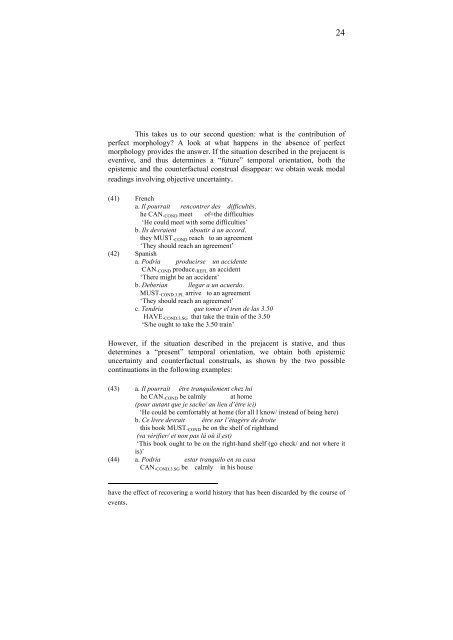On modal tenses and tensed modals - UMR 7023 - CNRS
On modal tenses and tensed modals - UMR 7023 - CNRS
On modal tenses and tensed modals - UMR 7023 - CNRS
Create successful ePaper yourself
Turn your PDF publications into a flip-book with our unique Google optimized e-Paper software.
24<br />
This takes us to our second question: what is the contribution of<br />
perfect morphology? A look at what happens in the absence of perfect<br />
morphology provides the answer. If the situation described in the prejacent is<br />
eventive, <strong>and</strong> thus determines a “future” temporal orientation, both the<br />
epistemic <strong>and</strong> the counterfactual construal disappear: we obtain weak <strong>modal</strong><br />
readings involving objective uncertainty.<br />
(41) French<br />
a. Il pourrait rencontrer des difficultés.<br />
he CAN.COND meet of+the difficulties<br />
‘He could meet with some difficulties’<br />
b. Ils devraient aboutir à un accord.<br />
they MUST.COND reach to an agreement<br />
‘They should reach an agreement’<br />
(42) Spanish<br />
a. Podría producirse un accidente<br />
CAN.COND produce.REFL an accident<br />
‘There might be an accident’<br />
b. Deberían llegar a un acuerdo.<br />
MUST.COND.3.PL arrive to an agreement<br />
‘They should reach an agreement’<br />
c. Tendria que tomar el tren de las 3.50<br />
HAVE.COND.3.SG that take the train of the 3.50<br />
‘S/he ought to take the 3.50 train’<br />
However, if the situation described in the prejacent is stative, <strong>and</strong> thus<br />
determines a “present” temporal orientation, we obtain both epistemic<br />
uncertainty <strong>and</strong> counterfactual construals, as shown by the two possible<br />
continuations in the following examples:<br />
(43) a. Il pourrait être tranquilement chez lui<br />
he CAN.COND be calmly at home<br />
(pour autant que je sache/ au lieu d’étre ici)<br />
‘He could be comfortably at home (for all I know/ instead of being here)<br />
b. Ce livre devrait être sur l’étagère de droite<br />
this book MUST.COND be on the shelf of righth<strong>and</strong><br />
(va vérifier/ et non pas là où il est)<br />
‘This book ought to be on the right-h<strong>and</strong> shelf (go check/ <strong>and</strong> not where it<br />
is)’<br />
(44) a. Podría estar tranquilo en su casa<br />
CAN.COND.3.SG be calmly in his house<br />
have the effect of recovering a world history that has been discarded by the course of<br />
events.

















